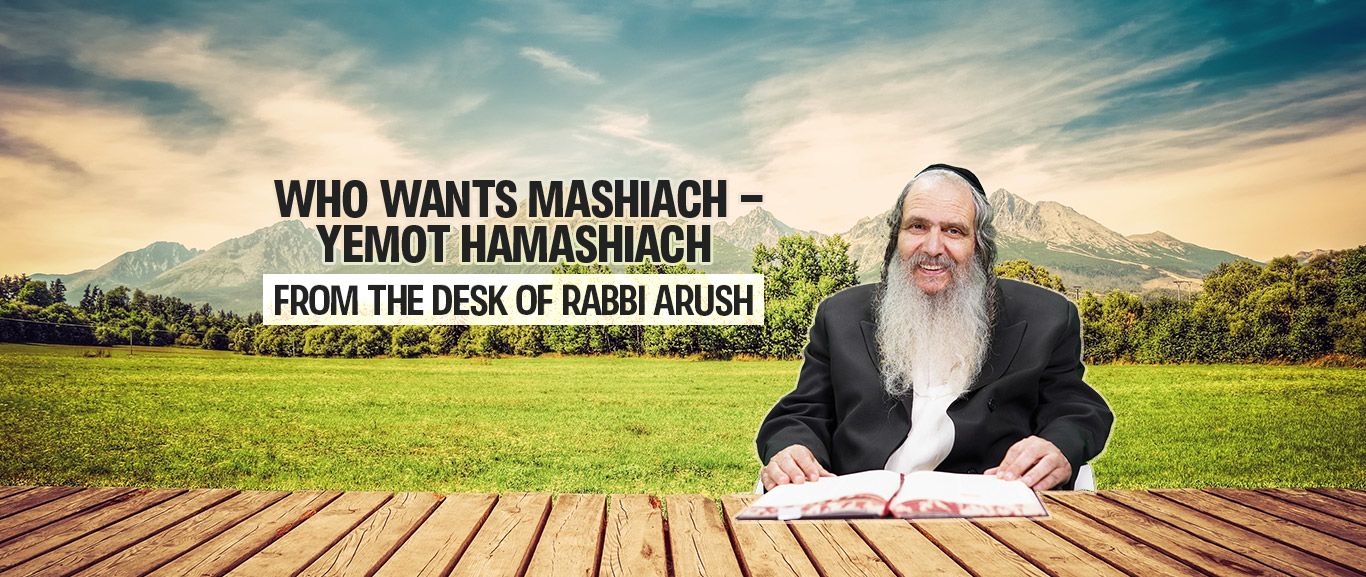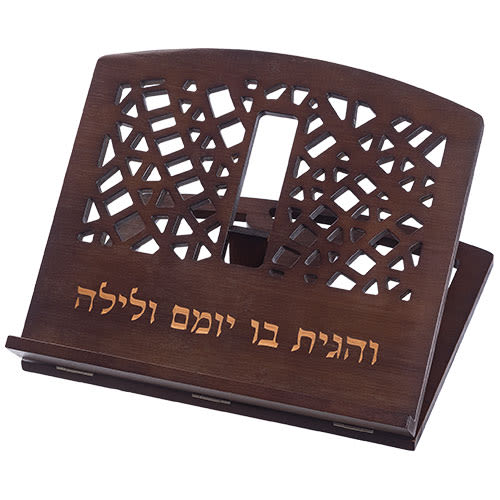
Who Wants Mashiach – Yemot HaMashiach
Redemption is a long and sometimes difficult process, both on the personal level and on the national level. Redemption is the process of tikkun (rectification). Rabbi Arush explains what we can do to effect our personal redemption-before the Mashiach arrives.

Translated from Rabbi Arush’s feature article in the weekly Chut shel Chessed newsletter. Third article in a series “Praying for Mashiach”.
“Maybe this week…” said Yosef to his friend in shul. “If Hashem will want, with His help,” replied the friend. Every week the two would fill out a lottery ticket and wish each other success. But that day, one of the people nearby heard them and broke into their conversation. “What?! You want to win the lottery?!” “Of course,” the two replied. “We have big families and married children. We want to buy them apartments, G-d willing. A few more millions won’t hurt…”
“Won’t hurt?! Really??” said the stranger bitterly. “You don’t know what you’re talking about. You don’t know my personal story, but I can tell you exactly what happens to someone who wins the lottery. It happened to me. After I won the lottery, my life fell apart. My home fell apart. And I owe so much money, that even if I work for the rest of my life, I will not be able to pay off even ten percent of my debts…”
This phenomenon of people all over the world who won the lottery, and their lives were ruined, is a well-known and extremely common phenomenon. How can one explain this?
The simple explanation is that anything in life that is not the result of hard work and a long and systematic process cannot endure and will cause regret.
There are no shortcuts in life! Any sudden, extreme change is very dangerous for the body and the soul – even a change for the better! And there are countless examples of this.
Even a prisoner who is released from prison goes through a difficult time because he is not used to life “outside”. And that’s why Bnei Yisrael didn’t leave Egypt in one day; rather, it was a process that took almost an entire year, when they were still in Egypt but had stopped working.
After the Exodus from Egypt, too, they had to go through a process of forty-nine days of refinement and purification before receiving the Torah.
And this is called “a hasty Geula”. The process wasn’t perfect, because there was no choice. And therefore, even after all that they were still not ready to enter the Land and were forced to spend forty years in the desert.
In the previous articles we spoke about the mistakes people make about Mashiach and yearning for the Geula.
In the first article, we emphasized that one should pray that the Geula will come with great mercy, without troubles and disasters, and that all Jewish souls, without exception, will be worthy of the Geula.
In the second article, we emphasized that one should pray for the Geula only from a place of complete faith, in other words, from a place of joy and gratitude for everything we have, and not because we are struggling with our problems; we should ask for the Mashiach who will reveal and publicize Hashem’s Name, and not an imaginary Mashiach who will solve all our problems.
In this article, we will speak about another mistake, which complements the first two points.
There are those who think, mistakenly, that the coming of Mashiach will be in one moment, and afterwards everything will be completely different. That is a huge mistake. The period of Yemot haMashiach (the time of Mashiach) will last for years and will include deep processes and a slow reconstruction of the Jewish People. There’s no such thing as “suddenly everything will be good,” because such a change is dangerous and unhealthy.
These processes take place in the Jewish People collectively, and in each and every Jew personally.
And these processes are difficult and not always pleasant.
Therefore, when you ask that Mashiach comes so that you won’t have to go through the process, you are actually asking for something that is the exact opposite of Mashiach. Whoever really wants Mashiach wants to see the process of the Geula, and this we can see right now, already.
Yes, all the problems and all the difficulties we are experiencing – we don’t understand what Hashem is doing – but it is clear to us that just like this whole long exile is part of the preparation and refinement of the Jewish people before the Geula, so too all the problems we have today are an inseparable part of the process of the Geula.
And so, when one prays that Mashiach will come, one should ask for that not because we’re tired of going through the process of the Geula but so that we will see Hashem’s Divine Providence in the Geula process clearly and experience it with full emuna (faith) and joy.
And so too with each Jew in particular. A Jew who truly wants Mashiach to come understands that the process of his coming is a process of tikkun (rectification), and that that process he can begin himself at this very moment.
Rabbi Natan said “My Mashiach is here already,” because Rabbi Natan was involved in his own personal tikkun according to Rabbi Nachman’s advice and engaged in hitbodedut each day. And he knew that this is exactly what the Mashiach will tell all Jews to do, so there is no difference between before the coming of Mashiach and afterwards.
The term Mashiach comes from sicha (conversation), because he will cause all Jews to speak to the Creator in their own words and do teshuva and cheshbon nefesh (taking account of their deeds) every day and go through a long and systematic process of rectification of their middot and acquisition of emuna.
In this process there are difficulties and nisyonot, tests of one’s emuna. This “training” is not easy, because to be worthy of Geula, one must work! We ask for Mashiach not so that we won’t have to work; we ask for him so that we will speed up and increase our work.
So, anyone who works on himself and does an hour of hitbodedut every day is already living in Yemot haMashiach.
What is this like? To be a combat soldier one must go through hard and difficult training. A soldier starts his boot training, and after a week he has had enough, and he tells his commanders: “I’m tired of this boot training. I want to go straight to infantry and serve on the front…”
If you work on yourself, you are preparing yourself for the coming of Mashiach in the best way possible, and so you can pray that the Mashiach will come; but if you’re not working on yourself and are not paying attention to what’s happening to you – you ought to be afraid of the coming of Mashiach!
Geula is not some kind of shortcut; it is a process. Whoever prays for Geula should pray that he will be able to do the maximum on his part to further his personal process and that of the Jewish People as a whole, and that he will have the strength to move forward and withstand the processes of the Geula.
For we have gone through this long exile so that we will come out of it “not hastily,” as the navi (prophet) says: “this time you will not leave in haste, you will not leave in flight.” (Yeshayahu 52:12) The midrash says: “You left the land of Egypt in haste, but at the end of time you will not leave in haste, you will not leave in flight.” The Kli Yakar says about this: “In the final Geula, after sin will have been completely erased by this long exile, their merit will be enough for them to leave exile fearlessly, smoothly, without delays, and without haste.”













Tell us what you think!
Thank you for your comment!
It will be published after approval by the Editor.